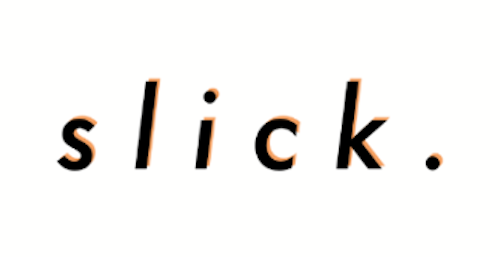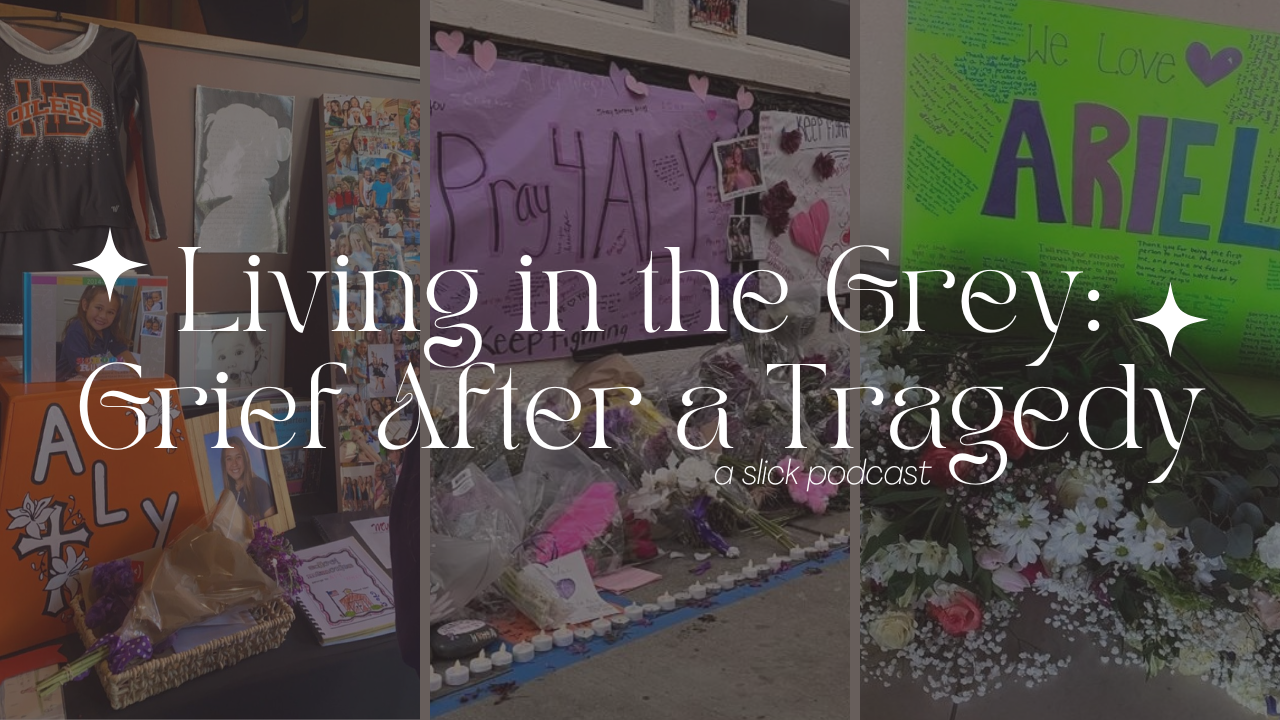Living in the Grey: Grief After a Tragedy, a Podcast
June 9, 2023
TRANSCRIPT: “Welcome back to Slick Magazine! I’m a staff member, Izzy Vosper, and after a rough couple of months, I think it’s time we break down the term ‘grief’ and make it more digestible. Today we’ll cover individual grief, community grief, COVID-19, coping skills, and various personal experiences. Merriam-Webster Dictionary defines the term ‘grief’ as, “deep and poignant distress caused by or as if by bereavement.” Here to break down that wordy definition is HBUHSD educational psychologist, Heather Balog, who specializes in grief and trauma. So, to start, Ms. Balog,”
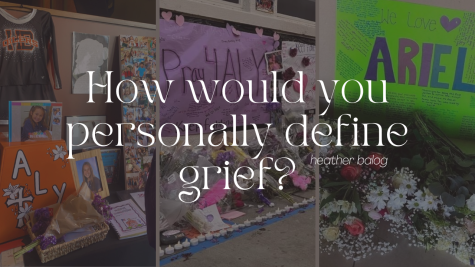
Q: “How would you personally define grief?”
A: “So actually, I think the way you define it is absolutely perfect. I mean, I think that what we have to remember is that we’re made up of thoughts, feelings, and behavior and sort of we have thoughts and then we have feelings related to that. So grief is an intensely personal process that is one that you’re going through a loss, hence the stages. But it really is your reaction to an experience of how you kind of go through life and go through these processes.”
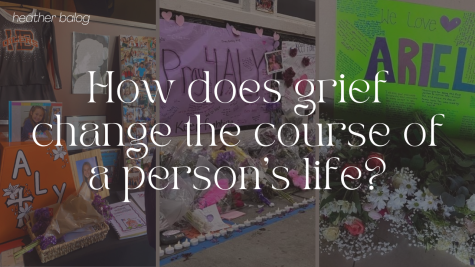
Q: “How does grief change the course of a person’s life?”
A: “So you kind of made a really interesting distinction that I think is important. You use the word trauma, you use the word grief. One does not happen without the other. So trauma is the event and it’s a relationship we make to a sudden event to people that go through a car accident have a completely different reaction, right? Much like grief, I mean much like trauma, excuse me, grief and trauma are interrelated right, and there’s a lot of factors that go into a traumatic event and what we make sense of it. So anything that is related to grief, right, has a traumatic event. Be it a car accident, you’re grieving some normalcy, be it the loss of a pet, loss of a human, whatever it is. So trauma starts and there’s reactions to that trauma. There are a lot of things that mitigate how we respond. Is it the first time you’ve had trauma? How many traumas have had you before? What’s your support system look like? We know that grief and loss is cumulative. We kind of pick this up. If you have processed it before correctly, you’re going to process it better the second time. Do you have a support system? Do you have self-care? So it’s as complex as we are as humans, how we respond and kind of interact with this very organic experience.”
“If you have a not awesome relationship with someone in your life, the grief process and the loss of that is a lot more complex and convoluted than, let’s say, like the loss of a very supportive and amazing and kind of pure stream type of person. Everything’s complicated and has two sides of the coin. But if you had a warm, nurturing, amazing relationship with said person versus a tumultuous love-is-pain and things are kind of all over that grief and loss is very different, which makes it more complicated because maybe in a way, I feel really bad, but I’m relieved because you don’t get to hurt me anymore. But now I feel bad because I feel relieved because you’re my whatever you are to me. I think that’s the thing is, and I get it, we try to boil down this thing that’s so complicated and nuanced down to one thing that’s just a bottom line because we want to, as humans, compartmentalize black and white, understand, dissect, quantify, do all the things. But the reality is we have to live in the fray. We have to live in the grey. It’s its own thing. It’s dynamic, it’s organic, it’s personal, it’s complicated.”
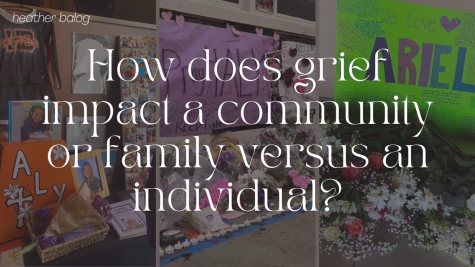
Q: “How would you say grief would impact a community or family versus an individual person?”
A: “So we have intra – inside ourselves -responses, actions, and we have inter, right, between. Like intrastate, interstate, ‘kay, so it depends. So I guess, do we want to kind of talk about the recent tragedy that happened? So we, the, when we lose anything, there’s a community aspect of it okay. So with the recent tragedy that happened with this young woman, there were a lot of complicating factors that made this very significant and impactful for the community top to bottom. We had longevity of her standing within the community in many different domains dance, cheer, church, all of these things. We had, unfortunately, this matters, the perception of that person. Sadly, it’s a lot easier to accept a loss when we can in our brain say well you did this so this equals that. So if a kid dies from a drug overdose it’s a lot easier for us to say well that’s why this happened. When a kid dies because of these seemingly avoidable and unfair things we have two polarizing magnets we try to put together. How could something this pure, this beautiful, this wonderful be taken out it’s not okay it’s not fair. So the impact of this community the global racing of this student the beacon of positivity the just multiple involvements over sports and cheer and all the things, this made a global impact on our community in a way that a slightly less popular less present less involved kid. See, it’s like a spiderweb of fingers in the community. Her impact was far and global and reaching and profound. So there we have it. This was a big tsunami there not all the same. We’ve had a lot of deaths of students that were a lot more quiet right and then in this one it’s a combination of factors. We call it cognitive dissonance when I want to make sense of two things that won’t go together. Beautiful perfect angel: taken accidentally. We’re trying to put these together and they won’t fit so what we have to do and it’s hard, this is grey, this is the fray is put them down in our lap and just hold the pieces of information and the discomfort that they won’t go together and there’s no sense to be made and man does that make us feel vulnerable, cause if this could happen to that kid it could happen to my kid if this could happen to her it could happen to me, and we want to say ‘but if we just did this and she just had this,’ it was just… it was just the perfect storm.”
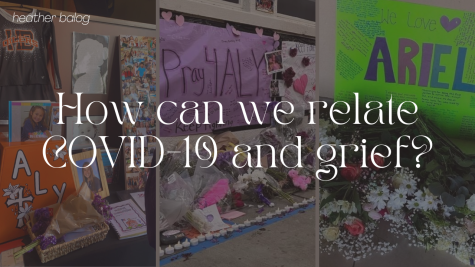
Q: “How can we relate COVID-19 and grief?”
A: “It’s one of the biggest traumas and tragedies that we’ve had to date as humans. We are grieving the loss of everything that was, we are grieving the loss of everything that will be. The fundamental issues, the course, and the trajectory of the humans as we know it. A thing that could have united us was politicized and polarized us. We have less compassion, less empathy. We have a lot more judgment, it was not equitable. It only kind of underscored and exacerbated all the inequities. A poor family that worked in, like something, was a lot different than a very white rich family, right. Healthcare, alcoholism, like all of the access to your resources, like all of these things pressure cooked, right? And now, much like pre-9/11, we know we’re not safe anymore. We used to think we were safe, and that just took us down. The fray, the gray, we control nothing. We want to control everything.”
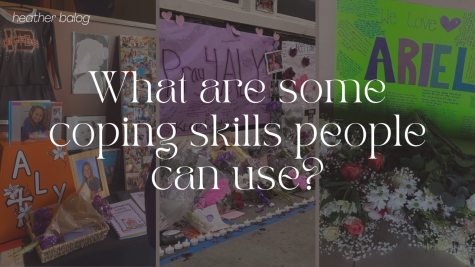
Q: “What are some coping skills people can use?”
A: “Hanging out with people, writing, poetry, like, there’s a ton of things that you can do for coping skills it’s really anything that helps you feel better and kind of moves you through this hard moment. Sometimes you need something more intense. Sometimes you might need to run a mile, you might need to work out, maybe need to do a drum circle, maybe play a guitar, you need to sing a song. It’s anything, it can be everything, right? So the self-care pieces, the most fundamentally important piece, that we’re taking care of ourselves and trying not to get through that painful moment with things that hurt us and make us feel worse: drugs, drinking, alcohol, hanging out with toxic people, scrolling through your “Facebook” page. Well, you guys don’t use “Facebook,” but, you know, some “Tik Tok,” right? That’s all feeding that response, but none of its lasting, and it doesn’t make us feel better, right?”
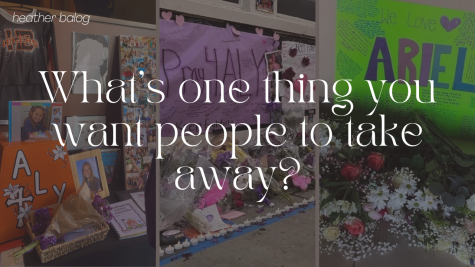
Q: “What’s one thing you want people to take away?”
A: “That were beings going through life, having human experiences, and you have to feel it all and experience it all. You can control nothing and try to accept everything. So ours is not to ask why, but to give space for whatever. I feel really terrible today, okay? I just feel terrible today it’s okay, doesn’t mean I’ll feel terrible tomorrow, but I might and I’m just going to not fight it and be like, okay, I feel terrible today. What can I do? What do I need? Can I reach out to a friend? Do I listen to music? Because thoughts are thoughts, believe our thoughts, but they’re just thoughts and they will pass. You have hundreds of thousands of thoughts a day, but when we become entangled with those thoughts, then we start feeling these things. I am having anxiety. I am not my anxiety. I am having sad feelings. I am not a sad person. There are two distinct and separate things that we fuse all the time. And we think our thoughts, our reality. And in fact, they’re just thoughts. So, trying to anchor yourself in this moment and try to see that there’s a big timeline of life and this moment and hundreds and hundreds of moments, will pass like everything else does and not to outrun it or out text it or outdrink it or out anything but to sit in it and feel it and cry it out. And you know, just like do the one care. You can’t not feel pain, you can’t not feel angry, you can’t not feel sadness. And one of my favorite therapists, who I kind of want to be when I grow up, is Esther Perel, and she said we don’t need an excuse to laugh, but we feel like we always need an excuse to cry.”
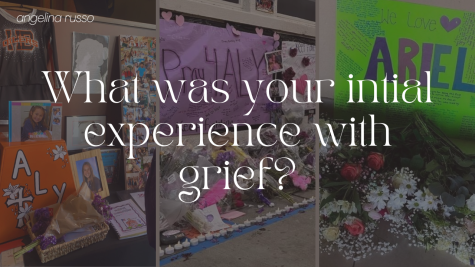
“Bringing us back to the topic of community grief, here to talk about Ariel Rule’s death is junior Angelina Russo, who attends Huntington Beach High School, and the Academy for the Performing Arts.”
Q: “What was your initial experience with grief?”
A: “That’s a good question, actually, because it was kind of a weird way that I found out along with a lot of other people. So, we have this—I know Ariel from acting, and I was also in history class with her—but, we have this acting kind of group chat and a person sent an “Instagram” post from her sister saying, like, rest in peace Ariel and we were all like, ‘oh my God, like what happened?’ You know, so that’s kind of how we found out, and it was honestly really shocking. I remember I was alone at home. I was doing homework and I just saw that and like, like it kind of puts a stop to just everything that you immersed yourself in your everyday life. You know because you have school responsibilities, you have sports, maybe I have acting, so it’s like all these things going on constantly it’s kind of like a rush, and then like that message comes through and you’re like oh my God and the world just kind of goes silent.”
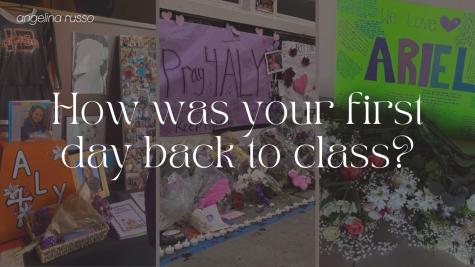
Q: “How was your first day back to class?”
A: “Oh my gosh. Yeah, because you kind of like, at least for me being alone, I didn’t even tell my parents, like when I found out. So you kind of deal with it in your own ways at home like alone in your room, whatever. But then it’s time to like come together and like face other people that knew her, and so, it’s kind of a difficult thing to experience because it’s like, okay, it was hard for me, but look at how hard it is for all these other people. And I think that was probably one of the I don’t want to say like more so than hearing about her passing, but it was definitely… it made it a lot more difficult to deal with because, you know, just seeing how it affected all my friends. I don’t know, it’s really rough and so when we all came together that first day back at class, we set up a memorial for her in the theater, and it was nice, you know. But it was also like, very kind of—I think, at least for me—it was a little too early. Like, I felt maybe I shouldn’t have gone to that class. I don’t think I was ready. It was really tough too, to just be like walk through the doors that, you know, she walked through a year ago.”
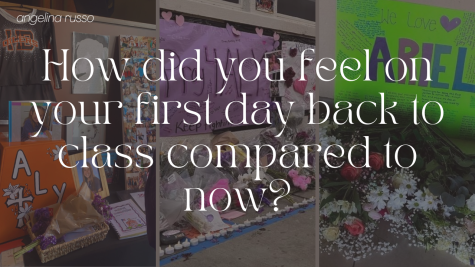
Q: “How did you feel on your first day back to class compared to now?”
A: “Yeah, I definitely do feel different. I think like any even with anything, not just grief, like the more time you give something, the more you’re gonna kind of grow, and your perspective is going to change a lot of things. So I’ve had a lot of time to like kind of reflect, I guess, and just like I wasn’t the closest in the world we definitely like spoke a decent amount. Like I said, I had history with her, so I saw her nearly every day. But just the fact that it affects you that much for someone that you maybe weren’t even the best of friends with it, kind of makes you appreciate all the people that you are close with a lot more. So initially I was just kind of shocked by everything and it was overwhelming but I’ve kind of, I mean, I’m still processing and stuff because I’ve never really experienced any kind of grief really. This is like a first for me. Since then, I’ve like grown I guess in the sense that I appreciate people a lot more just in general because even, not like strangers but even acquaintances in my classes. I just I feel so much more connected to people and I just appreciate everyone a lot more.”
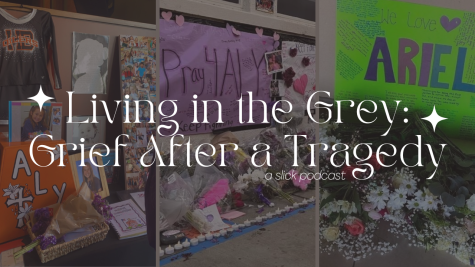
“That just about wraps up today’s segment. A huge thank you goes out to Ms. Balog, Angelina, and of course, everyone listening for giving us insight into the extremely complicated experience we call grief. Even as a host, I felt connected to what we said in these interviews, and hopefully, one of you out there feels that way too. Thank you for listening, this has been Izzy Vosper at Slick Magazine.”
